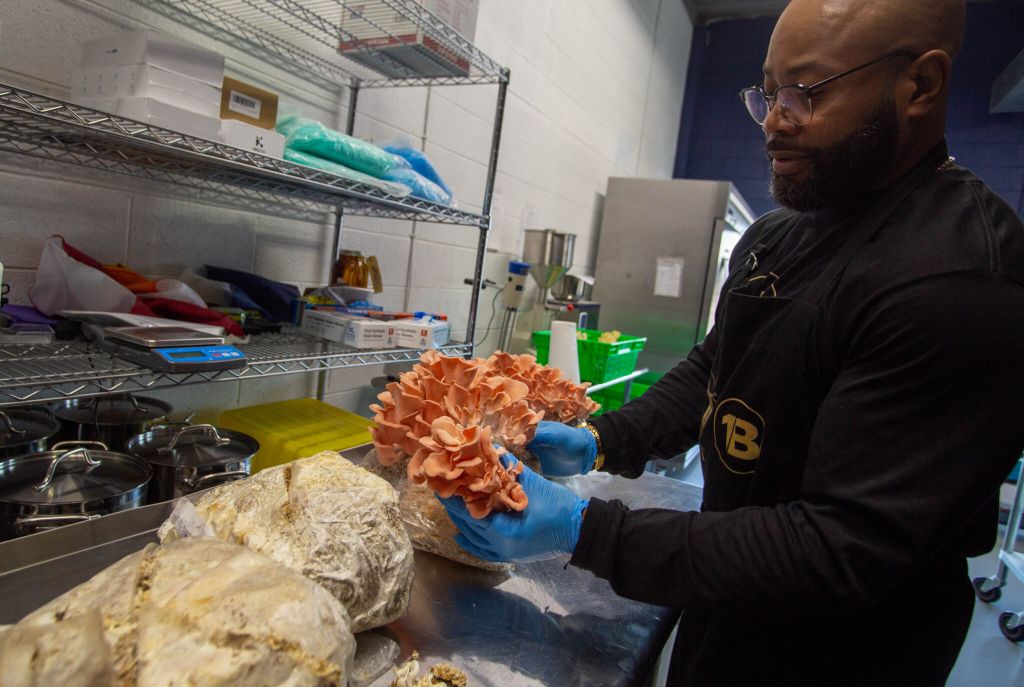Originally published in The Laurel Independent newspaper.
When Laurel resident Cory Moore accompanied a friend to a birthday party in 2017, he had no idea his life was about to change. Nor did the birthday girl, Elizabeth Robinson, who is also a long-time Laurel resident.
The two developed a fast friendship, and as the months passed, they formed a partnership and developed ideas for a business. Each had climbed corporate mountains and racked up successes — Moore as an expert in opening franchises for Gold’s Gym and Robinson as an accounting and finance manager for Marriott International’s headquarters. Along the way, though, they’d each developed health issues related to their stressful lives. Moore and Robinson also found their way to greater health through healthy eating, using plant-based tinctures and changing their lifestyles.
After forming their partnership, the pair rented a large art space in the District — 2,000 square feet where they could offer events focused on community health and wellness. But when COVID-19 shutdowns impacted their business, they had to pivot.
As pandemic-related supply chain issues hit grocery stores, Moore noticed that some items, including meat and other nutritious foods, were more available in higher economic areas, while poorer communities were struggling to provide consumers with healthy choices.
The two partners researched other business options aligned with their core values of plant-based health and nutrition, and they eventually decided to become urban farmers of a sort and grow mushrooms.
With a lot of research under their belts and a good business plan in hand, they secured a microloan from the USDA’s Farm Service Agency and a grant from Maryland Agricultural & Resource Based-Industry Development Corporation (MARBIDCO). They even got a grant from BeyGOOD, the public charity foundation founded by Beyoncé Carter-Knowles. They were among thousands of applicants.
It took over a year to get their business up and running, and while they made a number of mistakes along the way, The Garden International, in Beltsville, is now thriving. Moore and Robinson are growing 20 types of mushrooms that they sell locally at the Butchers’ Club, in Maple Lawn, and at seasonal farmers markets. They also deliver their produce throughout Maryland and ship across the country and to Canada, as well as to several countries in Europe. They also sell mushroom-growing kits and mushroom supplements.
“We’ve learned so much along the way,” Robinson said. “Mushrooms, sort of like when raising your kids, are all different. Not only do different types of mushrooms have different requirements and grow at different paces, but even the same species can grow differently from batch to batch. They kind of do what they want.”
“Figuring out how much raw materials to order, and figuring out how much to grow and when — these have all been challenges for us,” Moore added. “Sometimes we’d show up at a farmers market, flush with beautiful mushrooms to sell, but the weather that day was rainy and cold, and few customers were out.”
Realizing they couldn’t rely solely on local farmers markets, and running the numbers on wholesale versus consumer sales, Moore and Robinson soon realized online sales and local delivery in the state were the way to go. Their revenue ratcheted up quickly once they pivoted to online sales. Moore does still market to local restaurants, particularly those wanting to enhance their vegetarian options.
“You’ve got to try our lion’s mane mushroom crab cake recipe,” Moore said. “The mushroom has a seafood flavor and texture, making it taste and feel like crab. It’s divine.”
Even as their business needs to make a profit, Robinson and Moore have more than money on their minds. “Before anything, we are first and foremost a wellness business building a wellness community,” Moore said. The two partners have recently leased land for a farm in Clinton, which, in addition to expanding their mushroom-growing operation and allowing them to add more plants and herbs to their future offerings, will become a place people can visit and learn more about urban farming, plant-based health, mushrooms, hemp and more. They envision hosting classes, field trips and events for a broad community.
Their mushroom-growing kits, which offer a fun and flavorful activity for anyone, have been a particular hit with teachers. When Stacie Vernor, a mutual friend and fourth-grade science and math teacher at Bond Mill Elementary School, brought kits for four different types of mushrooms to school, she was delighted with how enthusiastically her students responded.
Four science classes watched a video on how to grow the mushrooms, Vernor said, and students then watered and measured the mushrooms daily to record how much they grew. “Some kids even sang and talked to the mushrooms to help them grow more,” she said.
Vernor worked with The Garden International and hired a curriculum-development expert to create seven lesson plans aligned with new science education standards being implemented in numerous states throughout the country.
“Developing the curriculum was more challenging than I thought it would be,” Vernor said. “Elementary school science is based more on plants and animals, but mushrooms are fungi, not plants. Using the mushroom grow kits as a base, we were able to weave together lessons about soil health, ecosystems and more complex content. Plus, it’s just plain fun to watch these beautiful mushrooms grow.”
Providing community education, exposing people to more plant- and fungi-based health options, and encouraging more people to do urban farming are core goals for Robinson and Moore. They’re hosting the National Urban Farm Fest in Brandywine this April and have a number of state agencies, local farmers, food trucks and others coming as vendors and educators.
The dynamic duo has been attending career days to talk with students about agriculture, mushrooms and nature. They also volunteer for a number of organizations, including the Southern Maryland Agricultural Development Commission, the Farm Bureau, the Prince George’s County Food Equity Council Soil Conservation District and the Maryland Department of Agriculture’s Urban Farm Advisory Committee. They’ve been helping with legislative and policy changes to make urban farming more accessible, farmers markets more successful and local grocery stores more proactive about purchasing fresh locally grown produce.
“They say, ‘When you love what you do, work isn’t work,’ ” Moore said. “We love what we do. We love the impact we have on our community and beyond.”
For Robinson and Moore, The Garden International may turn out to be just the beginning. With Moore’s background in franchising, Robinson’s strong business acumen and their larger goal of helping people live healthier lives, they envision more growing operations and even franchises in the future.
Partners through and through, they have another business in the works, this one based on a technology-infused resistance band for which Moore received patent approval last summer.
“We’re a great team,” Robinson said. “Cory brings the fire and energy to the room. He’s a great storyteller and has the skills to communicate our shared passion and purpose. He’s more outgoing and really enjoys interacting with people.”
Moore weighed in, noting that Robinson is “a top-notch financial professional and business manager. She’s smart, detailed, strategic and she, like me, believes fully in the good work we’re doing.”
To learn more about The Garden International, go to thegarden.farm.

Courtesy of The Garden International.




